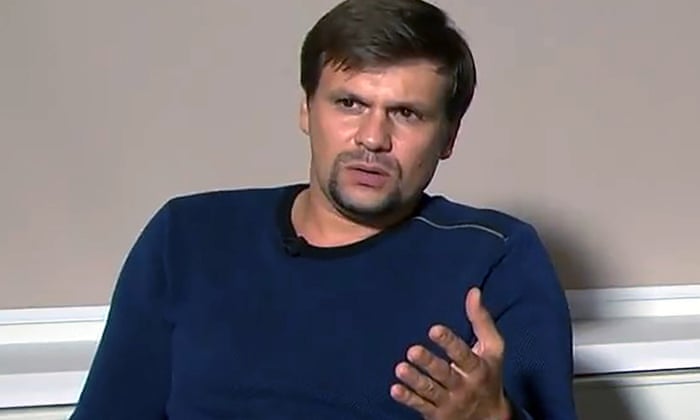Salisbury poisoning suspect identified as Russian colonel
‘Ruslan Boshirov’ is actually decorated GRU officer Anatoliy Chepiga, investigators say One of the Salisbury suspects, named initially as Ruslan Boshirov, now identified as Col Anatoliy Chepiga. Photograph: Tass
One of the Salisbury suspects, named initially as Ruslan Boshirov, now identified as Col Anatoliy Chepiga. Photograph: TassAndrew Roth in Moscow and Vikram Dodd-
One of the two suspects in the Salisbury novichok poisoning has been identified as a highly decorated officer in Russia’s military intelligence service (GRU).
The online investigative sites Bellingcat and the Insider uncovered information identifying one of the two suspects – previously named as Ruslan Boshirov – as Col Anatoliy Chepiga, a special forces veteran.
British investigators also believe one of the pair is Chepiga, the Guardian understands.
Chepiga, a veteran of the war in Chechnya, was awarded the country’s highest state award, hero of the Russian Federation, in December 2014 when Russian officers were active in the Ukraine conflict.
The Russian ex-spy Sergei Skripal was poisoned along with his daughter, Yulia, in the nerve agent attack in Salisbury in the UK in March. Both later recovered but have remained out of public view.
A discarded perfume bottle used to carry the poison caused the death of one woman who came into contact with it, Dawn Sturgess, and injured her boyfriend, Charlie Rowley.
The two suspects – Boshirov and another man named as Alexander Petrov – have been charged in the UK with attempted murder and conspiracy.
The naming of Chepiga eviscerates claims by the Russian president, Vladimir Putin, that the two men are civilians and have no links to Russian state intelligence.
Men claiming to be Salisbury novichok attack suspects speak to Russian state TV – video
Russian television had presented the two suspects, naming them as Boshirov and Petrov, as tourists who travelled twice to Salisbury because they were determined to see the city’s cathedral.
The use of a nerve agent in the UK by Russian agents has led to the worst diplomatic fallout between London and Moscow since the cold war. The UK and its allies expelled more than 100 diplomats in March and the US is set to enact more stringent sanctions tied to the use of a nerve agent by Russia.
Moscow has continued to deny that Boshirov and Petrov are Russian agents, despite British insistence that there is evidence the two men have ties to the state and scepticism at home over their bizarre TV interview.
Bellingcat and the Insider had earlier uncovered passport files for Petrov stamped with the words “top secret” and “do not divulge”, along with a telephone number for the Russian defence ministry.
In a description of its investigation, Bellingcat said it found Chepiga by identifying military academies in Russia’s far east where the two men were likely to have studied and then matching a picture of the suspect to a man in camouflage gear.
From there, the reporters tracked Chepiga to two addresses in Khabarovsk and Moscow, and also obtained leaked passport data showing photographs that matched Chepiga to Boshirov.
Chepiga, according to the investigation, was born on 5 May 1979 in a village called Nikolaevka in Russia’s far-eastern Amur region, and enrolled in a military academy at the age of 18. Petrov is married and has a child, the report says, but does not provide more information on his background.
It is not clear why Chepiga received the state award. A government site merely said he had “conducted a peace-keeping mission”. Putin did give awards to other Russian military units operating covertly in Ukraine at the time. Chepiga did not keep any accounts with social networks and there was little mention of him otherwise on the internet, the report said.
British authorities had earlier said that they believed Boshirov and Petrov were pseudonyms, but did not give the men’s true names. CCTV images released by Scotland Yard showed the two men arriving at Gatwick airport and travelling to Salisbury before the attack.
Elements of the men’s story, which was told in a Russian-language interview with the editor of the state-financed RT television station, did not seem to ring true.
While the men said they travelled to the city to see the cathedral, they were caught on CCTV walking in the opposite direction, near Skripal’s house. On the day the poison was sprayed on Skripal’s doorknob, the two men left Salisbury and headed directly for Gatwick airport. Skripal and his daughter were later found unconscious in the centre of Salisbury.

